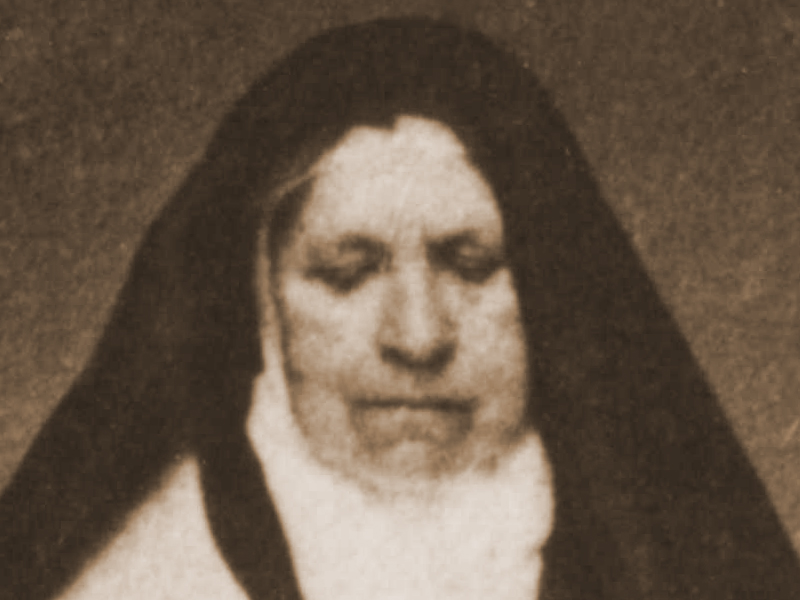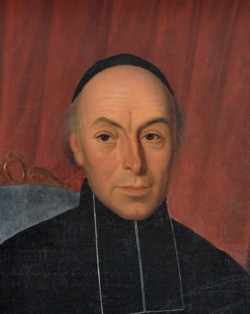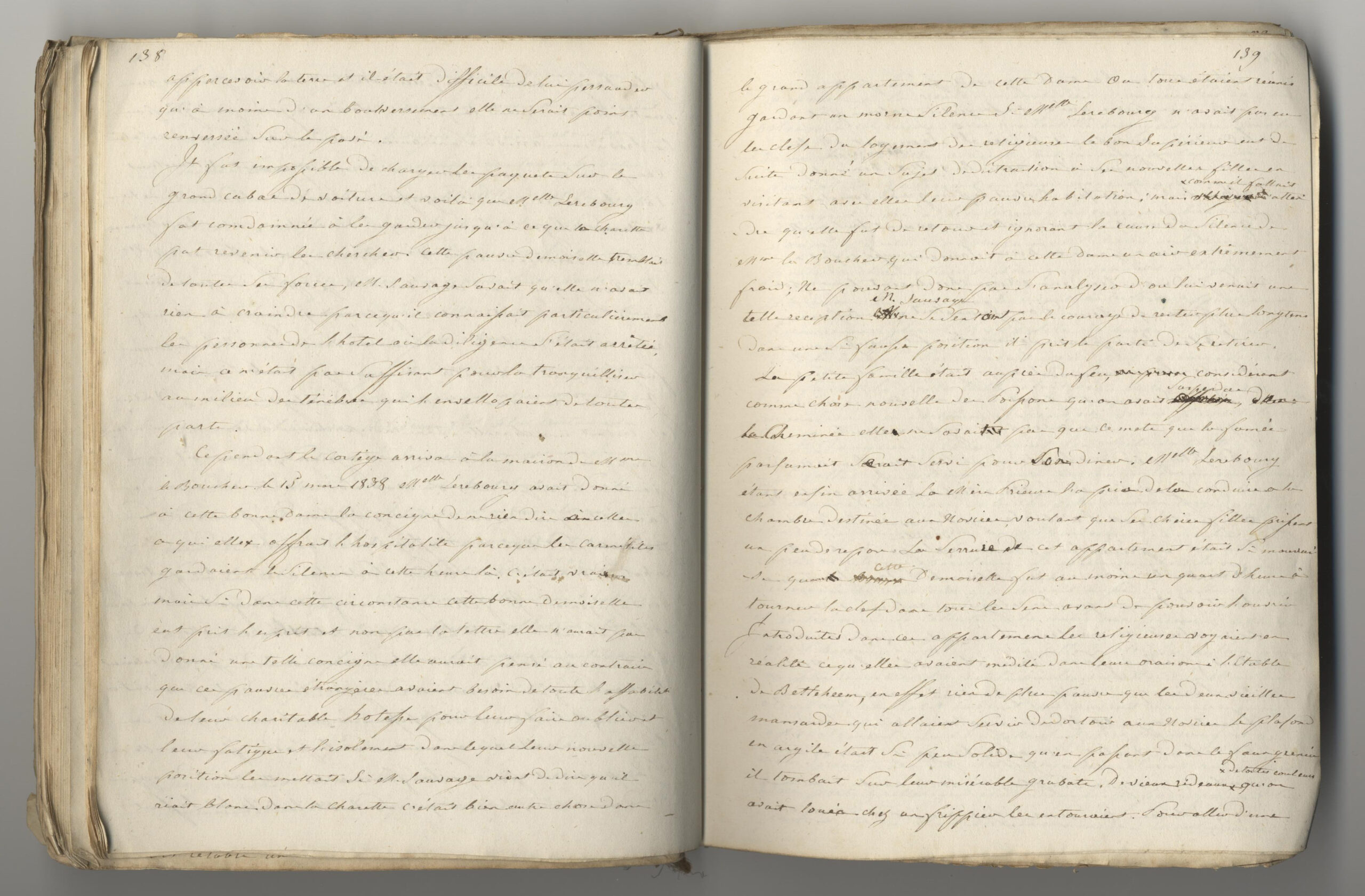unpublished text by the hand of Mother Genevieve - 1835-1838
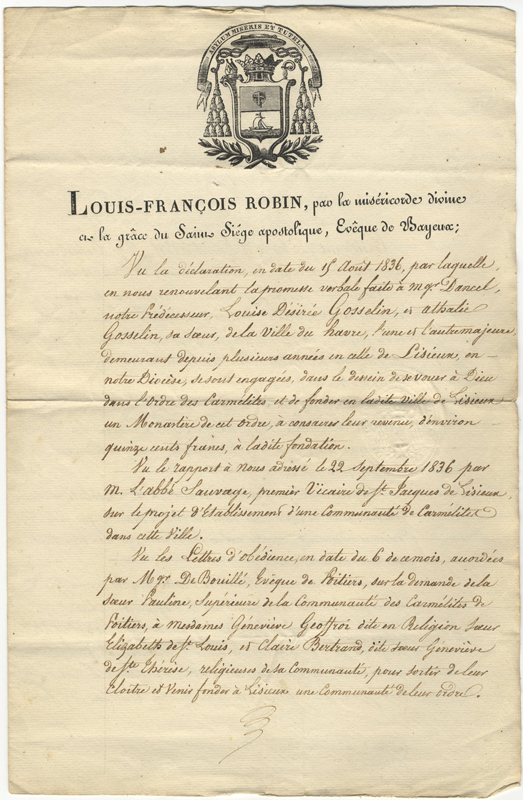
26th February 1838
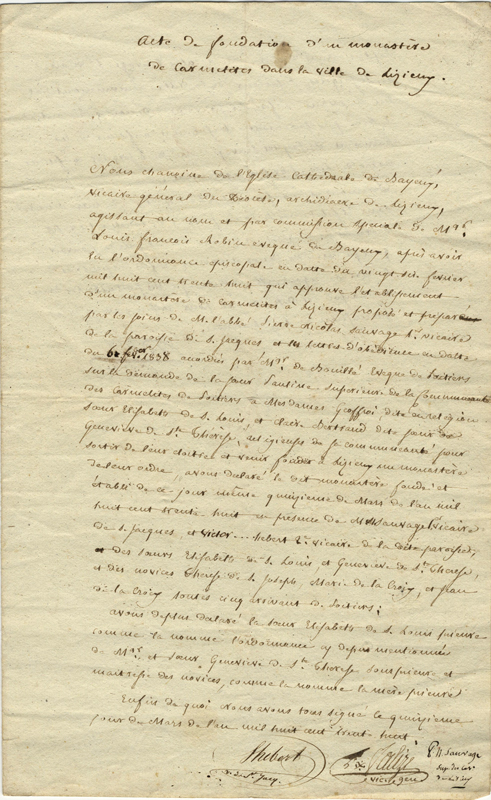
March 15, 1838
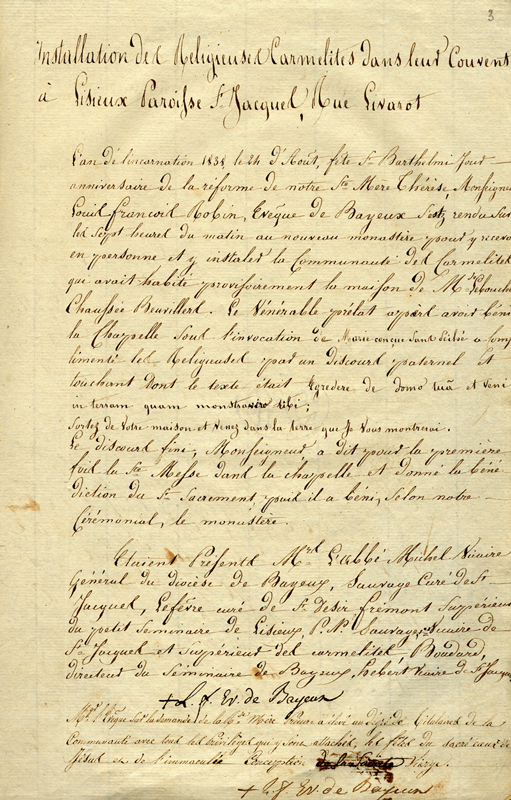
August 24, 1838
From the providential appointment in Lisieux of the future founder of the Carmel

[In 1835] Father Pierre Sauvage was at the Séminaire de Bayeux surrounded by his companions and the affection of his pupils, who were almost all of distinguished merit, several having been raised to the Episcopate and a large number now occupying the first priests of the diocese. Monsignor Brault then Bishop of Bayeux appointed after the death of Monsieur Giret, parish priest of Saint Jacques de Lisieux. Mr. Nicolas Sauvage to succeed him; he was then first vicar of this parish.
This nomination gave this worthy Prelate the idea of engaging Father Pierre Sauvage to leave his congregation to help his respectable uncle; he offered it to her in the most flattering manner. After some reflection, Monsieur Sauvage complied with the wishes of his Bishop. It was around this same time that the Seminary of Bayeux also saw Father de Rochemonteix leave. He left the congregation of Saint Sulpice at the request of his relative Monseigneur de Bouillé, Bishop of Poitiers. Monsieur Sauvage and Monsieur de Rochemonteix always maintained the most tender affection for each other. The parishioners of Saint Jacques welcomed their pastor's nephew with eagerness and happiness.
Future foundresses... expelled from a Carmel!
Among the penitents who placed themselves under the guidance of the new vicar of Saint Jacques, Mademoiselle Caroline Guéret, cousin of Father Boudard, felt the effects of his paternal solicitude; her holy director, recognizing in her the marks of the vocation of the Carmel, solicited and obtained from the Reverend Mother Pélagie, prioress of the community of Pont-Audemer, her admission into this monastery, he himself wanted to introduce her to the Reverend Mother.
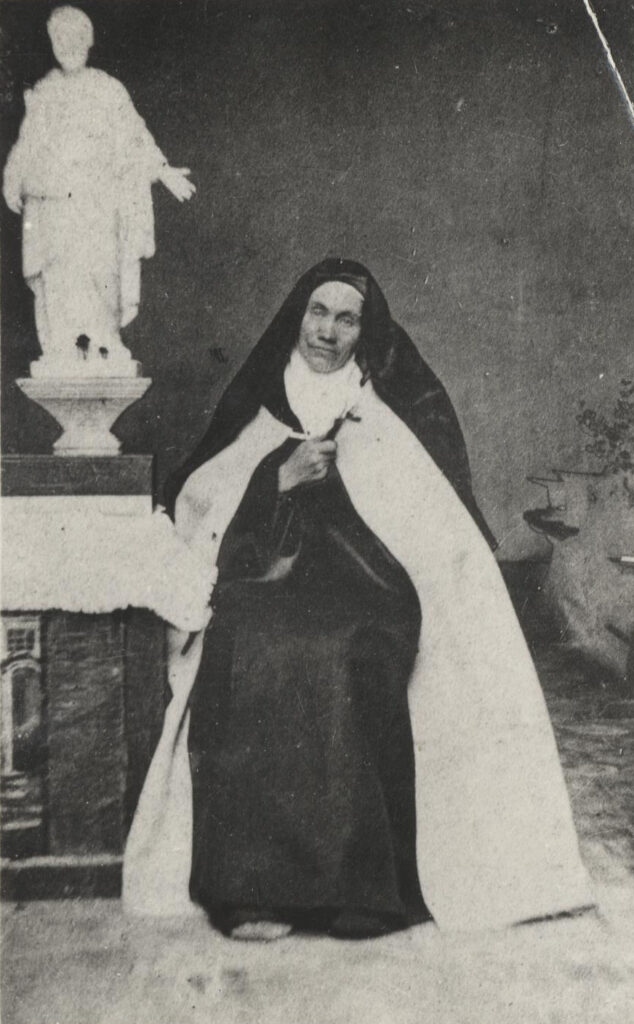
There was then in the Novitiate Mesdemoiselles Gosselin, Sisters belonging to a respectable family from Le Havre. Opposite, Athalie Gosselin, the eldest, who became Mother Thérèse of Saint-Joseph.
These young ladies who had had their education in this community were tenderly loved by it; but the weakness of their health made him suspect that they could never follow the Rule; it was decided that they should be urged to adopt a less austere mode of life.
Mother Félicité, who had succeeded Mother Pélagie, made this proposal to them with difficulty, knowing how distressed they would be; in fact, the attraction they had for the Carmel gave them this blow that could not be felt and the Order of the Visitation that was offered to them could not console them for the pain that the thought of not being Carmelites caused them. . Madame Saint Charles suggested to them the project of a foundation in the city of Lisieux. This nun who had been their mistress when they were boarders had a mother's tenderness for them. It was this affection which gave him the idea of this project of a foundation.
A conspiracy of holy women... and a saint?
Madame Saint Charles being the niece of the late Monsieur Giret parish priest of Saint Jacques de Lisieux, she knew this city and the piety she had noticed there made her believe that the Carmelites would be well received there. But it was necessary to entrust this project to a zealous ecclesiastic; she then thought that Monsieur Sauvage, whom her community had just made acquaintance with, would be very suitable to give her a happy success. Mother Pélagie as prioress [of Pont-Audemer] had had relations with this worthy ecclesiastic, she had also known Monsieur Sauvage very particularly, her uncle, parish priest of Saint Jacques during the revolution; she therefore approved this choice as well as the [new] Mother Prioress Félicité. Father Lambert Superior of the Community and Father Thorel who was chaplain were of the same feeling. It was on the feast day of the Assumption in 1835 that Madame Saint Charles made the proposal to Father Sauvage, she urged him to come to the community in order to examine the two foundresses and to come to an understanding with them in order to to pursue this important matter together.
On reading this letter Monsieur Sauvage recoiled, not believing himself fit to make such a great enterprise succeed; However, he informed his uncle, who did not share his fears, on the contrary urged him to take charge of this good work by promising his help. It was indeed in the designs of God that this holy priest founded in the diocese of Bayeux a convent of Carmelites. The illustrious Saint Thérèse had communicated her spirit to him, as to another Elisha, by covering it with his cloak (before becoming a priest, Monsieur Sauvage had put on him the cloak of this great Saint that the community of Carmelites, rue d'Enfer [ in Paris] kept in a shrine), he was to follow his example and triumph through his patience and perseverance over all the obstacles that were to arise from all sides. He had a presentiment of them but his courage was not shaken by it.
He left for Pont-Audemer and had a long talk with Mesdemoiselles Gosselin. He was very satisfied with their dispositions because they added to a good vocation a strength of character which was very necessary in order not to be put off by the difficulties they foresaw. They immediately offered up what they had, first their income, which amounted to fifteen hundred francs, and later the capital, which was forty-five thousand francs. Mademoiselle Athalie Gosselin was then 27 years old and her sister Mademoiselle Désirée was 25. It was agreed with Monsieur Sauvage that they would board with the Benedictine ladies of Lisieux.
The bishop opens the door
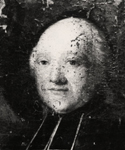
After this conference Mr. Sauvage wrote to Mr. Abbot Michel Vicar General to ask his opinion and his mediation with Monsignor Dancel, Bishop of Bayeux. Here is his response to his letter:
Sir and dear colleague,
The prelate is absent and must be until September 4 or 5. On his return, if you can leave them to me until then and if you see no inconvenience, I will communicate to him the two letters that you entrusted to me. In the meantime, here are my thoughts:
1° I desire in my private individual that a community of Carmelites can be established in our diocese; it is almost the only one missing.
2° I think that in addition to some income, you have to be sure of a house.
3° It would also be necessary to be sure that a community of Carmelites would agree to give or lend at least three nuns to start and direct the new establishment.
4° I believe that on these conditions Monsignor would approve and favor the foundation that the pious young ladies who seem to me animated by such pure views wish to make.
5° Lisieux or Caen, but especially Caen, where there used to be a house of Carmelites seemed to me to be appropriate.
Be kind enough to assure yourself whether the conditions of which I have spoken can be realized, especially that marked in 3°; and to share them and your own thoughts before Monsignor's return.
This answer was very favorable, so it brought joy and hope to the heart of the one to whom it was addressed, he communicated it to the Gosselin ladies who, feeling the same feelings, hastened to go to Lisieux.
The family of the founders: a conciliatory family... but not too much!
Madame Saint Charles undertook to inform the family of these young ladies of this new project, it was easy for her to fulfill this mission, having been a boarder with Mademoiselle Flore Gosselin, and found herself very intimately linked to this respectable family. Unfortunately she does not present the project as it was, she made the title of founder shine in the eyes of these ladies as giving them some privileges. These ladies who only envied what could bring more expansion to friendship flattered themselves that for them the railings which made such an impression on them would disappear. On the other hand, we only spoke of giving the income of their sisters, so they were very glad not to be disinherited. It also seemed that the community of Pont-Audemer, Madame de Saint Charles would make this foundation. Their Sisters made them the most advantageous portrait of the one they already looked upon as their Superior. Everything being thus presented under such a favorable point of view, Mrs. Gosselin and her young ladies welcomed this new project with satisfaction. Mademoiselle Adélaïde Gosselin promptly made the trip to have the pleasure of embracing her Sisters. Monsieur Sauvage was then absent, which was a deprivation for this young lady, she expressed it to him in a letter which she wrote to him and which gave her extremely good and conciliatory heart the greatest pleasure.
Sir,
The interest that you have the kindness to show to my sisters made me wish to have the honor of returning my visit to you, they will have been able to tell you how much I was deprived of finding you absent knowing that you were so devoted to them, I feel need to talk to you. Please, Sir, I beg you to excuse the liberty I take for the reason which makes me do so. Before I was fully aware of the reasons that had made them leave Pont-Audemer, I was rejoicing in the hope that they would enter a less austere Order, and above all not grilled; but when they had let me know everything I saw that it was a path that I had cherished too much. At one time I had pushed selfishness so far as to wish them to fall ill in order to see them return with us, but when lately I saw these poor children so changed, so dejected, I then had the courage to be generous and internally formed the wish that their project succeeds since their happiness seems to be attached to it. Your devotion, Monsieur, is too well known to me for me to feel the need to recommend them to you. I rely on your concern for them. Their health has suffered a great deal from the turmoil of their minds, I hope that when they are calmer their bodies will be better, nevertheless my dear Désirée would need distraction, exercises, please take care of it, as well as to my poor Athalie, whom I found quite changed. These poor children are deprived of their good friends; they took so much from Mother and Sisters, it was a great consolation for us. May you, Sir, through yours, make him find their absence less bitter than I wish with all my heart to be short-lived (if, as I said above, it is for their happiness.)
Accept please, sir, all my gratitude.
Informal approach to a first Carmel
That it has never been easy to work for the Lord...
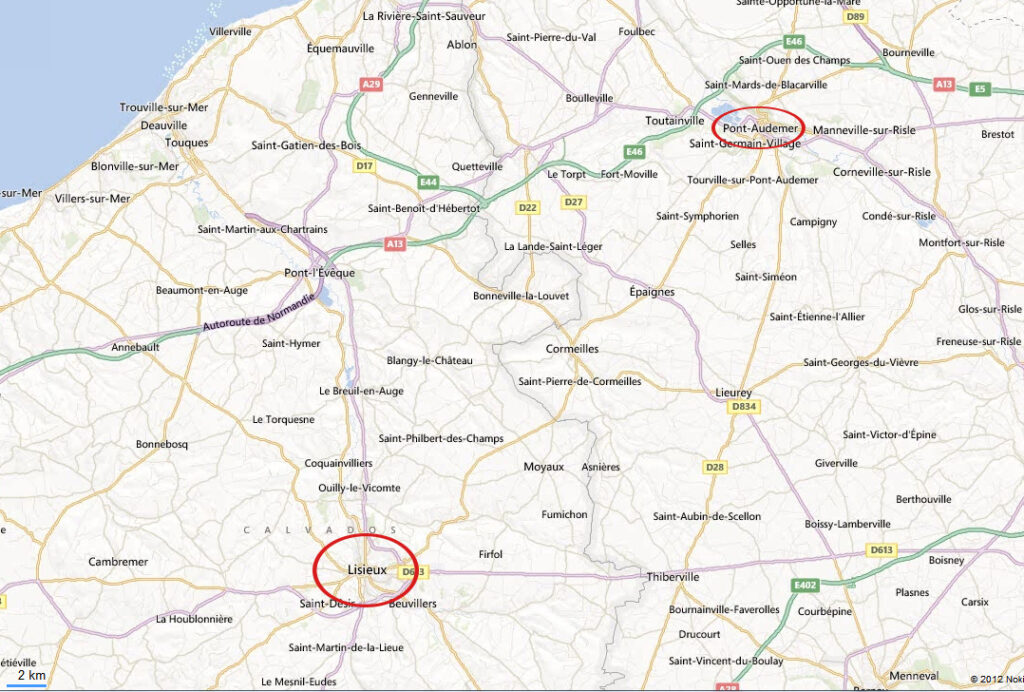
Father Sauvage was happy to see his project seconded by the family of the foundresses. The support of the first Vicar General made him hope that the community of Pont-Audemer would provide subjects, especially Madame Saint Charles, which everyone wanted. For the location of the establishment, Monsieur Sauvage preferred Lisieux to Caen, he fruitfully exercised the holy ministry in this city, he loved it, it was only right that he sought to call upon it the blessings of Heaven through the prayers of the daughters of Saint Thérèse.
He also saw in it an advantage on the temporal side by the hope that his uncle gave him of a benefactress who by her liberalities was to support the foundation. Nothing therefore seemed to oppose Monsieur Sauvage's project; nevertheless he was on the eve of encountering the greatest obstacles. It was a work of God, it had to be crossed. The Carmel of Lisieux was to find its difficulties more or less similar to those which the Abbé de Brétigny overcame in the establishment of the French Carmel. But Monsieur Sauvage, faithful imitator of the invincible patience and constant perseverance of this great servant of God, was to triumph like him over all that would oppose his pious plan.
A first hurdle
The first obstacle that arose was on the side of the bishopric: Monsignor Dancel had taken information on the convent of Pont-Audemer, he learned that it had boarders, this innovation made him fear that this community was not regular, he did not want it to found in his diocese. This is how he explains himself in his letter to Monsieur Sauvage dated October XNUMX, XNUMX:
I have read with ever-increasing interest, Monsieur and worthy Abbot, your letter of the fifth of this month and that of the twelfth on the establishment of a Carmelite convent in my Diocese. On each page of your report I blessed Divine Providence for having put me in a position to realize a wish that I had been making for a long time and I could not thank you too much for the powerful means that your piety and your zeal offered me, to succeed in it. . It took me, I dare say, courage to stop on such a beautiful path and take, before giving my full consent to such a good work, a few precautions and gather some information on the personnel of the nuns destined to form the nucleus of this nascent community and put it on the footing of perfect regularity. But this information is far from reassuring me. I will therefore wait for some new opportunity to naturalize the daughters of Saint Thérèse in my Diocese, as I had the happiness of attracting the English Carmelites to the Diocese of Coutances when I was Vicar Grand, it was I who there at forty-one received them in London when they left... Holland. The Catholic Bishop of London who had his Sister there had entrusted me with it. Returning to France and being parish priest of Valognes, I received them a second time; they settled in Thorigny, then in Valognes itself where they still are and flourish there. French women were admitted there. What do I know? if Mesdemoiselles Gosselin presented themselves there to try their vocation again, perhaps there would they find what they want...perhaps they would prepare there to form a new colony for me.
Accept, sir and worthy Abbot, the assurance of my high esteem, of my gratitude and my sincere attachment.
Ch. Bishop of Bayeux
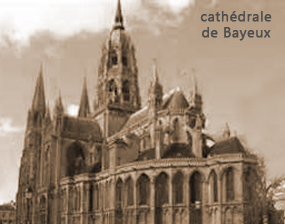
M. Sauvage communicated this letter to the Gosselin ladies on All Saints' Day. All three felt the blow keenly; however, Mr. Sauvage thought that new explanations were becoming necessary with the Bishop of Bayeux and therefore questioned the two young people again, gathered more fully the feelings that animated them and after this examination, he declared on their behalf to the Prelate that they were at his disposal to go to the convent he pleased to indicate to them, to make their project succeed. Here is what was the answer of his Greatness:
Sir and dear Abbot,
You must have appreciated the reasons developed in my last letter on the subject of the establishment with which you have so pleasantly flattered my imagination and which I am nevertheless reluctantly forced to abandon, at least in its present state. It would be possible to return to the project which is so dear to my heart, especially if, in order to form a convent in my diocese, the convent of Valognes could and wanted to give or lend, at least for some time, three or four good nuns, who would beginning to walk the work. And what happiness for me, who was the father of these English maids in London, 40 years ago, if from Bayeux I could reach out to those of Lisieux without leaving my diocese. Their chaplain, Mr. Marest, who knew them in France, is a man of leadership and who was everything to them. See if by a first letter to M. Marest there is a possibility of success.
When Babel threatens the foundation... but the bishop takes matters into his own hands!
M. Sauvage immediately wrote to M. Marest of Monseigneur's wishes, the worthy ecclesiastic did not wait for his answer; it was negative and gave the reason that the exercises were done in English; Mesdemoiselles Gosselin would have to find out. A new difficulty which did not allow the project to be adopted. So Monseigneur, wanting to settle the question, proposed to call M. Marest to Bayeux and have M. Sauvage come there with the foundresses. It was there that we had to take advice on the course to take. This council was to take place on December 15, 1835.
On the appointed day, M. Sauvage went down to the Bishop's Palace and the Gosselin ladies were received at the Charité community with special affection. M. Marest had already arrived; this true protector of the foundation saw the views of Mr. Sauvage at first glance. He read all the papers concerning the interior and the temporal. Monseigneur, who seemed very undecided at first sight, gave advice for the next day that he should take. Messrs. Marest, Michel and Sauvage composed it. The Gosselin girls, who had already had an interview with M. Marest, went to the office of the Prelate where their fate was to be decided. "Are you ready," asked his Lordship, "to make all sorts of sacrifices?" When they answered in the affirmative, Monsignor told them a little story relative to their position, questioned the young of these young ladies about her eyesight. "She is not blind," said the eldest, then she will make up for what she cannot do with prayer. – I believe so, replied the Prelate, the prayer will be sweets for her.
However, after weighing everything with truly paternal kindness, he wanted to gather opinions. The first and most decisive was that of M. Marest. He was favorable. M. Michel thought the same; that of M. Sauvage was not doubtful. Monsignor did not even want to ask. “Now, said the Prelate, we need Mothers. It was decided that M. Sauvage would write three letters to the nearest convents: in Paris, rue d'Enfer, in Rouen, and in Le Mans. Bishop blessed the future foundresses and they retired joyful and giving glory to God.
It was agreed that the following day the Bishop would offer the Holy Sacrifice in union with the prayers of Prince Hohenlohe [whose prayer was reputed to be effective]. It was an edifying spectacle to see the venerable Prelate surrounding the small nucleus of the future Carmel and calling upon it the help of God and the protection of Mary. Those whom he already liked to call his daughters made Holy Communion at the mass of his Majesty where Mr. Sauvage fulfilled the office of Episcopal Chaplain.
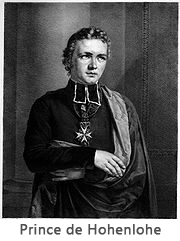
Approach of a second Carmel in Paris rue d'Enfer
a foundation for which one would go to Hell... under the protection of the Immaculate Conception!
It was from Bayeux that M. Sauvage wrote the following letter to the Mother Prioress of the rue d'Enfer in Paris:
The spirit of zeal and charity which reigns in the entire Order of Carmel inspires me with the confidence to address myself to you to beg you to take my request into consideration, and to weigh the reasons for it before God. There is no community of Carmelites in the diocese of Bayeux. Our Venerable Prelate ardently desires to found one in order to attract more and more the Lord's blessing to his flock. For this purpose, I have just presented to His Majesty two Sisters who, after practicing the Rule of Saint Thérèse, have for some time been planning a foundation in the diocese of Bayeux. Bishop himself wanted to examine their vocation, the goal they set for themselves, the means they offered to achieve it, and after having seen and heard these young elderly people, one of 28 years old and the other 25 years old, he felt that this important matter could be followed up. But to undertake it, we need nuns who can form our young Sisters, who stretch out to you Madam a pleading hand and conjure you in the name of our Lord, and of Saint Thérèse to come to their aid, so that they can carry out their pious purposes. Their voices, I am sure, will go to your maternal heart and you will help with all your power for the glory of God and of his Church, those who already like to call themselves your daughters.
You understand, Madam, the purpose of my letter; it is to ask you, with the permission and authorization of my Bishop, three or four subjects capable of forming in the practice of the rule of Saint Thérèse these first two postulants, to whom, I dare to hope, our Divine Master will join others. Allow me to anticipate the only difficulty that you may be able to oppose: the small number of your Sisters... But, if it is possible for you to overcome it, your charity will only be greater and more meritorious. Moreover, if you cannot give three, you will give two, even just one, because my intention is to knock on several doors of Carmel at the same time and to ask with perseverance for the subjects necessary for this foundation, which has already encountered great obstacles, a powerful motive for hope! If you cannot give, at least you will lend some subjects, and our Lord will know how to reward you with an alms which is so pleasing to Him. It is proposed to make the foundation in Lisieux where a benevolent person will join for the temporal and the two young ladies whose income is equivalent to a capital of 40Fr. which they will later dedicate to the good work. Please madam, examine this enterprise at your leisure and when Saint Thérèse has made you understand what she would do if she were in your place, you will kindly honor me with an answer. Please accept my gratitude in advance.
Bishop apostillizes this letter as follows: "I approve and ratify everything expressed in this letter by the pious ecclesiastic Father Sauvage, vicar of Saint Jacques de Lisieux who has so well made my feelings and my wishes perfectly in conformity with his, I therefore enclose my sincere congratulations to his »
It was at the feet of Notre Dame de la Délivrande that this letter was deposited as well as the two others presented to her by the postulants, but the eldest of these young ladies was so preoccupied in presenting hers to Marie, that it escaped her and fell into the trunk. M. le Bedel, missionary, sending her back to M. Sauvage wrote to her: “It appears by this little incident that the Blessed Virgin wants to take care of your business, you will no doubt not be angry. »
However, the time for success was far from over. Mary wanted to make her faithful servant walk by the way of the crosses, to support him in this painful journey she had made him taste the most ineffable consolations during the stay he made at the feet of her miraculous image. This holy priest, thus fortified, resolved to work with even more ardor to found a new sanctuary for her, which he proposed to put under the name of her Immaculate Conception.
On December 30 the Mother Prioress of Paris acknowledged receipt of the letter, her response was full of charity, of zeal for wisdom, after having pointed out that she needed to consult with her Superior whom she was to see only after month, she added: "If God allowed us to make this foundation, we would like to send a large enough number of nuns to be able to make it alone, having the certainty that those made by several houses do not succeed so well and offer more of difficulties. »
The Gosselin ladies sensed that their project would suffer from long delays, which made them plan to leave the Abbey because the pension rate was high and they wanted to save money. It was for this reason that they placed themselves as boarders at the Hospice-General, so instead of paying 1000 francs for boarding they gave the Hospice only 600 francs. Their desire to give as much as possible to the foundation made them reduce themselves to granting themselves only what is strictly necessary.
Rue d'Enfer lays down its conditions
The second letter that M. Sauvage was expecting from the Mother Prioress of Paris finally arrived on January 25, 1836; here is what it contained.
The Reverend,
I do not wish to delay in having the honor of replying now to your letters concerning the proposed foundation. I do not really know if it is our Lord who inspires in you this confidence that you are willing to have that it will be us who will undertake it, for we have always been in his hands ready to do what he wills not wishing in all this way than you Sir, only what will be most advantageous to his glory and the accomplishment of his divine good pleasure. We saw Abbé Boudot, our Superior, who was kind enough to give us his thoughts with the greatest interest. We also communicated ours to him, which we are going to share with you. It was therefore decided that we would not start anything without having a positive assurance on the following articles, these are essential measures of prudence and which are in no way in opposition to complete confidence and abandonment in the powerful help of divine Providence. You can imagine, Sir, that it would be painful for us to have begun this holy work and not be able to continue it.
1° the practice of our Blessed Mother Thérèse when she made a foundation was to rent a house for a while and to buy one only when she was there, it being much easier for her to judge by herself if a house could be conducive for regular observances. This is what, according to the advice of our Superior, we also wish to observe.
2° In this house of rent there must be a room to say mass there because we will not go out except the Prioress with one of the sisters, for what concerns the purchase of a house or to visit the buildings. This house will have to be big enough so that we can each have our cell.
3° Although we like to think that these young ladies, whose candor and simplicity we were extremely pleased with, are truly called to the life of Carmel, however, as sometimes our divine Master gives the desire for a vocation and does not does not want execution, and that is only by examination that one can judge of it. If it were so for these young ladies, what would become of the foundation? Would we have someone following the company? Because not succeeding they will keep the good that they intend.
4° Our house being poor and depriving itself of subjects which will leave it a great void, it will only be able to provide five nuns without income.
6° Who would furnish the house for the absolute necessary?
Here, sir, is the summary of the articles that the Superior and we deem necessary. We beg our Adorable Savior and His Most Holy Mother, the august Mary, to bless the zeal and devotion that you put into building for them a house that will be completely dedicated to them and where he will be served with fervor. We hope that our holy Mother Thérèse will help you in this holy enterprise. We can only give you a final decision based on your response.
This letter fills M. Sauvage and Ms. Gosselin with joy and confidence, who replied without hesitation to the Mother Prioress that if they were not received at the chapter, they would nevertheless support the foundation and that in the event that one of them would retire to another Order, then she would be satisfied with a modest pension. Monsieur Sauvage on his side answered the other questions as well as he could and told him about the house he intended to rent, which was located in the New World. Monseigneur de Bayeux had for his part written to Monsieur Boudot Vicar General of Paris and Superior as we have said of the convent of Rue d'Enfer to recommend the matter of the foundation to him. This Venerable Ecclesiastic replied that there was a possibility of giving subjects and that he was very close to corresponding with Monsieur Sauvage on this important subject.
All seems lost again...
Everything therefore seemed on the way to success when suddenly God, whose designs are impenetrable, struck the Mother Prioress with apoplexy and paralysis. This [sic] accident caused a delay which Father Boudot explained in his letter of February 3, 1836, which he wrote to Mr. Sauvage: "You are perhaps surprised, he told him, that I did not answer on the field to the letter that you did me the honor to write to me: I thought I should postpone for a few days, since the Mother Prioress had just given you the explanations you requested. But today a very unfortunate accident comes to hinder your plans and ours. This excellent mother is in a state which causes us the greatest anxiety, stricken with apoplexy and paralysis at the same time, the doctor has little hope of saving her. If we were to lose her, we would be unable to meet your wishes. If, on the contrary, the good Lord gives it back to us, we will immediately resume the thread of our correspondence, but I believe that in this case it would be good for two of our ladies to go to the scene, they would see things for themselves. If they are as they wish, they would report to their community. This way would seem to me shorter and more expeditious. Let's pray to God that everything will work out for his greater glory. »
The mother sub-prioress wrote along the same lines as her Superior and earnestly solicited the prayers of M. Sauvage and of the postulants in order to obtain the healing of their worthy mother. She then went into the most meticulous detail for everything concerning the distribution of the house and its furnishings. So many details at a time when the illness of Mother Marie Thérèse made it seem like a failure, the project seemed on the contrary to take possession. M. Sauvage was so convinced of this that he expected every day the two nuns of whom M. Boudot spoke in his letter. The most fervent prayers were addressed to Jesus and Mary to obtain the preservation of her who, according to appearances, was to give birth to the Carmel of Lisieux. But if God granted wishes by leaving this Reverend Mother on earth, her health, which was so weak, made M. Boudot take the resolution to have his community renounce its foundation. He wrote in these terms to M. Sauvage.
The Reverend,
The unfortunate attack which the mother prioress of our Carmelites has just suffered seems to have disconcerted all our plans. This good Mother is naturally in very delicate health and it is only by dint of care that one prolongs her frail existence. the duties of his charge, we even fear that a new attack will take him away from us. We only have one nun in the community who can replace her and it is precisely the one we had the plan to send you to be at the head of your establishment. His companions would never consent to his departure, nor do I have the right to impose the obligation on them. You see from this sir that we are unable to contribute to the execution of your project. We have here two communities of Carmelites, but neither can fulfill your views. Do not, however, renounce the desire that the Holy Spirit has formed in your heart, it is too wise and too Christian not to receive its fulfillment sooner or later.
Accept, Sir, the assurance of all our regrets.
At the same time, the Mother Sub-Prioress wrote a letter similar to that of her Superior. The Mother Prioress herself, thanking M. Sauvage for his prayers for his healing, also expressed her regrets to him and urged him to continue his efforts with the Prioresses of the other houses of the Order. Everything was once again reversed. The Calvary located on the road to Rouen was the place where Mr. Sauvage went to lay down his sentence, then he came to announce this sad news to his penitents who, in their surprise and their pain, resigned themselves to the will of God. M. Sauvage nevertheless still made new attempts with this community which could not have had any success, because one of M. Sauvage's friends who had gone to visit M. l'abbé Boudot learned from this worthy Superior that even when the Mother Prioress had recovered, the one who was to come to found was reluctant to take charge of a new establishment.
Attacking a third Carmel, but the bishop goes to Heaven...
However, the encouragement given by M. Boudot and by Mother Marie inspired M. Sauvage with the intention of knocking at the door of a second convent. The second letter approved by Bishop Dancel was intended for the community of Rouen. It then occurred to him to address himself there through Madame le Bénier, his penitent, whose father-in-law was councilor of the prefecture in the department of Seine-Inferieure. This faithful and zealous Christian went directly to the monastery to sound out the ground; the verbal reply of the Mother Prioress made M. Sauvage hope to see this community which had formerly founded Caen take charge of the foundation of Lisieux; consequently, in order not to let things drag on, he left for the capital of Haute-Normandie on the Monday after the octave of Easter (April 11, 1836) the next day he was kindly received by M. le Bénier who introduced him himself to the Reverend Mother Prioress. M. Sauvage was in charge of two letters from Mgr de Bayeux, one for the Mother Prioress and the other for M. l'abbé Libert Vicar General and Superior of this community.
After several conferences with this Reverend Mother, M. Sauvage returned to Lisieux to announce to his Postulants that business was going well and that the Mother Prioress hinted that she would give two nuns and a novice as soon as she could consult with his Superior then absent. M. Sauvage was so convinced of the success of his approach that he rented at 500 fr. a house located in the New World. This hope of success was shared with great pleasure by Mgr. Dancel and by M. Michel. The latter wrote to Mr. Sauvage on April 17: “Draw up a foundation project and send it to the bishopric, I will submit it for the signature of Mgr. but Mrs. the Prioress of the Carmelites of Rouen would have had to answer officially that one can count on so many nuns of her community; that his superiors formally consent either to give them or to lend them, for so many years and under such conditions or until such and such a time. I think that in case of misfortune before the signing of the act of foundation this holy enterprise could also succeed; but in any case, you always need a house that is somewhat suitable, insured, that is to say at least rented for a few years. Bishop weakens but does not seem to be suffering any more. M. Sauvage had informed M. Michel's council by renting, as we have said, a house in the New World. He hastened to send the letter from this worthy ecclesiastic to the Mother Prioress of Rouen. Here is the response she made on April 21, 1836:
Sir,
I do not have the consolation of giving you the decisive answer which you have so much reason to await with holy impatience. Our Superior will be here next week and he proposes to examine this affair with us, let us not be discouraged by this slight delay. While waiting for the orders of Mgr which we will be given by M. our Superior, receive etc.
This delay did not prevent Bishop Dancel from conceiving the sweet hope that this convent of Carmelites that he so ardently desired would see him established. He spoke of it heartily to his friend. Father Marest; but God deprived him of this consolation by calling him to himself at the moment when he proposed to sign the deed of foundation which M. Sauvage had addressed to M. Michel. Father Marest hastened to write to the Misses Gosselin to console himself with them for the loss they and their holy director had just suffered. “Alas! he told them that I often thought of you and of the good M. Sauvage when I learned of the illness and then the death of our illustrious and very venerable friend. Together we lost a truly good and generous friend, a friend such as one rarely meets in the world. We mourned him with you and the only thing that can console us in our deep sorrow was to think that he had gone to receive the reward of his good works and to pray for us in the abode of glory. What sweetness, what kindness, what amenity towards everyone but particularly towards you and your holy leader during the short stay you made in Bayeux, what ardent desire he had to see you established in community in his diocese, he still spoke to me all the paternal affection the day before and the very day of my departure; or hugging me in his arms, when I wanted to speak of thanks for his kindness towards me, he said to me with the tenderness of a true father, a sincere friend. “Oh! my good friend, it's me, yes it's me who thanks you for having come so far to oblige me in the season in which we are. No I will never forget it and if ever these good girls can succeed in establishing their community you will come and we will install them together. Hey! a short time later he is no more. like him he lost a friend, a protector, a father, for we see that he would have been all that for this foundation that M. Sauvage so ardently desired to establish. This venerable Prelate, in addition to the steps he had taken himself, had promised to authorize a collection in the diocese for the support of this holy establishment. So much devotion only made the sacrifice more bitter.
A founder who burns with zeal for his carmel
However, this loss did not discourage M. Sauvage: strong in his trust in God, he actively pursued his correspondence with the convent of Rouen, he represented to the Mother Prioress that the state of indecision in which he was left was essentially detrimental to the 'work. She answered him with a letter of May 24 to write directly to M. Libert, their Superior. “If he has reasons,” she added, “we ignore them. Mgr le Cardinal pronounced himself, it seems, in a very strong way. Allow us to remind you that when we had the honor to talk to you about this matter, we made you feel the need to collect donations and alms from all people well disposed in favor of the projected foundation, then as much as possible we We encouraged your zeal by giving you the assurance of our good will, if our Superiors had it in hand. When it comes to the glory of God seldom do we see obstacles. I am not at all surprised that our Superiors are taking the time to examine this matter carefully. Let the world speak and leave to God alone what you still need to obtain. I cannot disapprove of you for trying to find out whether the Superiors have any particular reasons for deferring or refusing. It is therefore to the Cardinal that you must address yourself”
This response was far from supporting M. Sauvage's hopes, however he wrote to M. l'abbé Libert and a little later to Mgr the Prince of Croï, he hoped to have the latter apostilled by M. Jumel, parish priest of Saint Desire and Vicar of Bayeux, but this respectable ecclesiastic thought he should not grant it, he praised the zeal of Mr. Sauvage, but he did not then count on the success of the enterprise. This feeling was shared by several highly commendable priests and people from high society who viewed this project as a chimera. So many oppositions did not in the least shake M. Sauvage's hopes.
Business of seduction of the new bishop
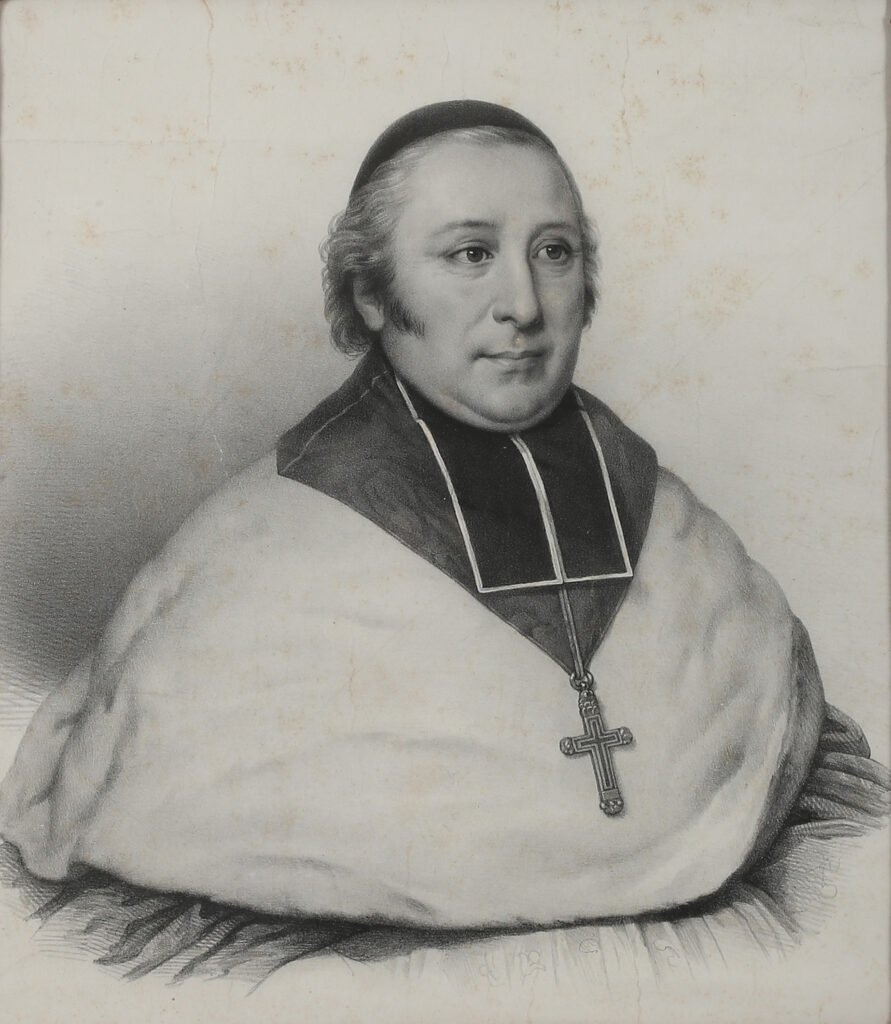
This confidence revived in his heart when he learned of the appointment of M. Robin, parish priest of Notre Dame du Havre at the Bishopric of Bayeux. This worthy pastor had had Miss Gosselin under his guidance, he had studied with their eldest brother, who was then a justice of the peace at Ingouville; he had been the teacher of the youngest and was interested in the whole family which he led in the ways of salvation. He knew the intentions, the steps and the sorrows of his former parishioners.
M. Sauvage believed that a trip to Le Havre to pay his respects to his future Bishop would interest him in the new establishment. He therefore left on May 31, 1836. He went down to Mrs. Gosselin's and was introduced in the afternoon to Mr. Robin's by the young Mr. Gosselin. The welcome was most favorable, remaining alone with him, Mr. Sauvage made known the steps he had taken near the convent of Paris and those he was currently making near the Carmelite community of Rouen to obtain nuns. to found a convent of this Order in Lisieux. “I can't do anything for the moment, replied Bishop Robin, I have no authority in the diocese, you come from Our Lady of Grace, you can also invoke her here. The next day his Grace admitted him to his table with Mgr de Nancy (M. de Janson) who was to perform the ceremony of the first communion on June 3, the day of Corpus Christi. On taking leave of Msgr. Robin M. Sauvage had the consolation of hearing these words which sustained his courage. “I will enter into your views”. Mr. Sauvage after having received testimonies of unequivocal benevolence from the whole Gosselin family left Le Havre on June 3, 1836 and returned to Lisieux in the evening. On his arrival he reported his message to the postulants who were delighted with the reception given to him by their parents. at the same time Mr. Sauvage received a letter from the Superior of the Carmel of Rouen, the contents of which are as follows.
Sir,
I received the letter which you did me the honor of addressing to me on May 26th. I beg your pardon for not having replied to the others I had received from you, I was on a canonical visit with the Cardinal, and always so busy that I asked the Prioress of my good Carmelites to well answer you for me. I wish I could say to you: hope. I admire your zeal and it would be very nice to be able to assist him, but we have so few subjects that it would be very difficult to limit the number. I spoke to Monsignor about it. His Highness agrees with me that our good Carmelite Mothers are already well overburdened and they would be even more so if they agreed to your wishes, however we must not lose all hope. You are going to have M. Robin for Bishop, he is very well with the Cardinal, it will be easier for him than anyone else to obtain this favor from his Highness. ; my good Mothers seem well disposed to make sacrifices for you, when you have given them all the guarantees they desire and I, as Superior, will also do everything in my power to help you complete such a pleasant work. to God and so advantageous for the salvation of souls
M. Sauvage could provide no other guarantees than those he had already given to the Mother Prioress; Guarantees, it must be admitted, were very precarious, because the Demoiselles Gosselin could not persevere and it would have been very painful for the Superiors to strip them of their patrimony to enrich the foundation. The other guarantees were based on guesswork only. Mr. Sauvage, seeing himself deprived of human resources, had recourse to prayer. Prince Hohenlohe offered him this help. The communities of Lisieux and others of the diocese joined him. Mrs. Ste Marie (née d'Osseville) Superior and founder of the community of Délivrande wrote the following letter to him on this subject:
The Reverend,
It is with the sweetest satisfaction that I promise you our feeble prayers that we will unite wholeheartedly with the good Prince who will raise his hands to heaven for the success of your pious enterprise. Have confidence if God wants this new community, he will know how to make it succeed in the midst of all the obstacles, as you say very well, I have met all kinds, and the faithful Virgin whom a House consecrated to her wanted , has smoothed them all out, you have to pray and pray a lot, be content to help Divine Providence which makes you succeed when you think you are missing everything; who makes use for the success of his work precisely of the means that had been employed to make it fail.
The letter of this worthy foundation revived M. Sauvage's courage. Besides, the forthcoming arrival of Bishop Robin, who had seemed to him so favorably disposed to the work of the foundation, gave him every reason to hope. M. Michel, who had learned from M. Sauvage of the warm welcome that this worthy Prelate had given him from his first interview, wrote to him on this subject: "The first impressions are usually the most lasting... as soon as we possess him among us, added this true friend of M. Sauvage, I will make it my duty to show him the keen interest that the late Bishop Dancel took in the success of the work, because it is certain that a community of Carmelites is essentially lacking in the diocese. He was therefore a Protector assured as much by his precedents as by his promises and his deeds.
For their part, the foundresses used a small industry to quickly and constantly fix the attention of the Bishop on their enterprise, they had a very pretty prie-Dieu made, the tapestry of which Mme Saint Charles had provided to offer it as a gift to the new Prelate, on the armrest was placed a medallion containing an image of St Thérèse: this image made hear all that they desired. Bishop was very flattered by this mark of attention and their delicate process, the kneeler arrived in Bayeux almost at the same time as the Prelate took possession of his seat; he was installed on his birthday, August 25, 1836, and on the 31st he thanked Mr. Sauvage in these terms:
The Reverend,
Asking you to deliver the attached letter to the good Misses Gosselin, I hasten to offer you my thanks for the part you played in sending the pretty prie-Dieu which they presented to me, and to assure you that it is very important to me to complete promptly and according to your wishes the beautiful work on which you have already worked so hard. To accept the assurance of the invariable attachment with which...etc.
Patience and adventures
This benevolent letter gave Mr. Sauvage great satisfaction. At the same time he received one from the Mother Prioress of Pont-Audemer who informed him that his community was finally going, according to the spirit of their institute, to get rid of the boarding school to devote themselves solely to the jobs and exercises of the Carmelites. She offered her Mme Saint Charles to come to Lisieux at the head of the postulants until it was possible to have nuns to lead the new community. Mother Félicité compared the small congregation of Lisieux to the so-called congregation of Saint Geneviève directed by Mrs. Acarie (Sr. Marie de l'Incarnation, founder of the French Carmel) This Reverend Mother would gladly have established herself as an intermediary with Msgr. Duchartelier, Bishop of Évreux, in order to obtain for Mrs. Saint Charles the necessary permission to fulfill this mission. M. Sauvage communicated this proposal to the Mother Prioress of Rouen who answered him on August 30 that she dared not give any other advice on this subject than to wait until the Superiors had pronounced and expressed their will. "Let's give up," she added everything to divine Providence, which we will not miss. If this good Sister Saint Charles is chosen and called to contribute to the foundation of the new establishment, the good Lord will give her in time to be useful, either soon or later, or in one way or another. Having to offer a suitable place and assured means of existence, God helping, your holy project cannot fail. Lots of prayers, lots of caution in the execution. »
Although the letter from the Mother Prioress absolutely rejected M. Sauvage's proposal, he did not allow, given the great desire he had to have Mme Saint Charles, to submit it to Mgr as we will see in the following letter that he wrote to His Grace.
My lord,
The Carmelites of Pont-Audemer are going to abolish their boarding school, there is a Lady St Charles who would be very useful to us and whom it seems easy to obtain. I had thought that one way of saving money would be to have a nun come into the house with the Gosselin ladies to dispose of everything, because we have almost nothing prepared and we have to pay both these young ladies and the rent of the house, which notably reduces our resources, so it would have been a great advantage for us to have Mrs. Saint Charles who has already rendered us great services, but the ladies of Rouen do not seem to like my plan. I had to consult them, I did. the answer is that we have to wait for the decision of the Superiors. This would doubtless be the wisest course if we had assured means of existence. Please, Mgr, let me know your will on this subject, a word put in the margin will suffice to make me understand it. »
His Grace immediately returned this letter with his words in the margin :
“You only ask for a word, my dear Abbot, and I really cannot give more; this word is that we must wait. Besides, I hope to be in Lisieux in 10 or 12 days and I will be able to tell you in person what I cannot entrust to a letter.
Mr. Sauvage and the foundresses sensed that His Majesty's intention was not to admit Mrs. St Charles to be part of the foundation, but they did not know the reason for this refusal and it was precisely this reason that Bishop only wanted to say. out loud. Mr. Michel, always zealous for the foundation, wrote to Mr. Sauvage.
"I have not lost sight for a single moment of the affair in which you take such a keen interest and which I myself have at heart, I have often spoken about it with Mgr who seems to me to be favorable to the work , but who nevertheless wishes to see for himself before deciding definitively; you know that he is going to Lisieux soon and that he will stay there for a few days, I must accompany him there. I will be happy to confer with you again and we can talk together about his greatness of this important project. Prepare our documents in advance, especially with regard to personnel and time.
Family and confusion
According to this advice from M. Michel, a new memorandum became necessary. Madame Sauvage took charge of it. This memoir after recounting what had happened under Bishop Dancel contained in substance:
1° The reasons for a continual perseverance in pursuing the project.
2. The means of execution were based on the bounty of Divine Providence, which uses the weakest means to achieve its ends; the examples of the saints who never hoped more than when they encountered greater obstacles...the perseverance, the generosity of the foundresses in the midst of battles of all kinds. Finally M. Sauvage invoked for himself and his small community the application of the epigraph placed at the head of the arms of the Prelate. “Asylum and protection of the unfortunate”. He begged his Majesty to write to Rouen to ask for nuns.
This memoir was presented to the Bishop in Lisieux on September 1836, XNUMX. The same evening on his return from Orbec, he justified all hopes by declaring that he adopted the project. The next day Mr. Sauvage presented the foundresses to His Grace. It was at the presbytery of St Pierre that this first meeting took place. Bishop spoke to them with great affection; it was then that he replied to Mr. Sauvage's letter by telling them that he had received a visit from Miss Adélaïde Gosselin, who had expressed her dissatisfaction with him about the promises that his sisters had made to give the community the property that belonged to them, that Mrs. St Charles, in telling them of the project of a foundation, had only spoken to them of the abandonment of the income, which thus she saw clearly that the family had been deceived. Monseigneur said that he replied that he had nothing to do with this matter, that it had been settled by his predecessor. She had added in speaking of Mme St Charles that the affection she and her family had always had for her, making this lack of frankness more bitter to them, she begged her Grace never to allow her to be admitted to of the community that her sisters wanted to found. That having promised, he had to keep his word.
M. Sauvage and these young ladies thanked Mgr for the kindness with which he had dealt with Mlle. Gosselin and they no longer thought of bringing Ms. St. Charles. This Lady had doubtless thought that she was not obliged when writing to Mrs. Gosselin to tell the whole truth. On this subject she wrote to M. Sauvage, who had informed her of Mlle. Gosselin's dissatisfaction: a providence that it was not earlier. Let us bless God for this new cross. I would like to be in charge of it alone and for you not to feel the repercussions. »
The Bishop of Bayeux hastened to write to the Archbishop of Rouen to ask for nuns, but an unforeseen circumstance put obstacles in the way, it was the resignation of Father Libert, who to retire to his family left his two offices as Vicar General and Superior of the Carmelites. However, this resignation had not yet been made when the Cardinal replied to Bishop de Bayeux that Mr. Libert being absent, it was necessary to wait for his return to finish this affair. This state of stagnation that had lasted for so long was very painful. Mr. Sauvage thought he was finally going to get out of it when he learned that Bishop was planning to make a trip to Rouen, he took this opportunity to recommend his company again to his Grandeur who replied that he did not know the new Superior. of the Carmelites, which did not prevent Bishop from taking the means to achieve the goal of his desires by speaking to Father Fayet, Vicar General, through whose hands almost all business passed. M. Sauvage learned of the result of his Majesty's efforts through a letter from M. Michel dated October 13th. "Having," he said, "accompanied the Bishop to Rouen, I myself spoke to MM the Vicars-General about our future Carmelites and the ardent desire you had to have at least three as ready. It was answered to me as well as to Bishop that there was only one available, according to the information given it could not be suitable. So we promise to knock on some other door maybe your perseverance will finally be crowned, and I have no doubt if God really wants the work. »
However Mr. Sauvage believed that it was his duty to make known to the Reverend Mother St. Françoise de Ste Croix what had been said to her without however naming anyone. He asked her again in the same letter for her notes and other papers. The Mother Prioress was ill when she received this letter, she charged Sister Marie Joseph to answer it and to ask Mr. Sauvage if he had an absolute decision and by what means he had been informed that the nun available could not suit. Our Reverend and very good Mother, she added, never thought of this sister. It could well be that Mr. Fayet, not being the immediate Superior of the Carmelites, he did not have perfect knowledge of what concerns this community. However, these questions had to be answered, and to do so, Mr. Michel's permission was necessary. This worthy ecclesiastic gave it in these terms: "You can respond positively to the prioress of Rouen that it was M. Fayet who told the Bishop of Bayeux that there was only one nun available and that this sister was the one you didn't designate. If the mother prioress has others, specific to the important work of the foundation, she should indicate them herself to M. Fayet and to the Archbishop. Once she has consulted with the diocesan authority and we agree, you will not experience any difficulties, I hope, on our side. »
This letter was communicated to the Mother Prioress of Rouen, so she sent back M. Sauvage's papers with a note that M. Libert had begun; she showed that the house of Rouen had good intentions but that he was not advising her to undertake the foundation of Lisieux; no doubt because he did not see enough guarantees of success and stability.
New carmel, new failure
Everything was over on the side of Rouen, M. Sauvage followed the course traced by the late Mgr Dancel, he therefore sent his third and last letter apostilled by this worthy Prelate to Mgr Bouvier Bishop of Le Mans. M. Sauvage rightly flattered himself with success, if the thing had been possible; he personally knew this worthy Bishop whose zeal he had been able to appreciate while he was Superior of the Seminary of Le Mans. Bishop Bouvier replied to Mr. Sauvage:
« Our house of Carmelites is of very recent foundation, the prioress and the sub-prioress are still strangers who have been lent to us and whom we have not had the means to return up to now. The mother prioress was good enough to write to Nantes, the house to which she belonged, to find out if we could render you the service you are asking for. I am sending you the letter she has just written to me on this subject so that you can see for yourself what she is telling me. The consolations that our nascent community gives me make me deeply regret not being able to contribute for the moment to preparing similar ones for my worthy colleague of Bayeux. I remember having seen you with interest and I would have congratulated myself on having been able to render you the service which you ask of me. but as you know: no one is obliged to do the impossible. »
New Carmel, new failure: bis!
The Mother Prioress of Le Mans expressed her regrets and those of the Mother Prioress of Nantes at finding herself unable to contribute to the good work proposed to her. We ask God with all our heart, she added, that he procure for this holy ecclesiastic the help necessary for the execution of his projects; it is the only means we have of proving to him the interest we take in the work for which he has already taken so much trouble. M. Sauvage, seeing that this third letter had had no happier success than the first two, wrote to the Bishop of Chartres (Claudel de Montale). The venerable prelate answered him in these terms:
Sir,
The superior of our Carmelites having made an absence, I awaited his return to reply with more knowledge to the letter that you did me the honor of writing to me. This ecclesiastic whom I maintained upon his arrival here testified to me that it was impossible for him to yield to you any subject placed under his direction. A fact that he told me prevented me from insisting on your needs and on your request. Our Carmelites have essential obligations to Madame de Soyecourt and yet they have refused her on several occasions the same kind of help that you ask of them; you can judge by that, sir, that I have no means of entering into your views; moreover so estimable and so worthy of praise.
Accept sir the assurance of my regrets.
New carmel, new failure: ter! Doubts arise...
This letter, as we see, had no happier success than those which had preceded it. Doesn't it seem that Mr. Sauvage must have been discouraged seeing all his useless attempts? For 16 months he had taken charge of this holy work; he had struck successively at the convents of the rue d'Enfer in Paris, Rouen, Le Mans and Chartres. The first two had kept him in suspense for almost the entire year that had just passed, the last two had formally refused immediately, but the zeal of the holy priest was too pure, his intentions too upright and his love for glory of God too great to abandon this enterprise with which God himself had entrusted him by his holy inspirations and by the voice of his Superiors, the Bishops of Bayeux.
He therefore thought of applying to Mother Prioress de Vaugirard, persuading himself that such an influential person would easily give him or procure for him nuns for his foundation. It was through Madame, my Countess de Pardieu, friend of Madame la Comtesse d'Hinnirdal, niece of Mother Camille, that he made her present his request. He flattered himself that the affection that Madame de Soyecourt had for her niece would make him welcome, but he was still disappointed in that regard, for here is what the Ladies and the Mother Prioress of Vaugirard wrote to him; Madame d'Hinnidal said to Madame de Pardieu in her letter of January 23, 1837: "I considered myself happy, Madame, to be able to seize the opportunity of being good for you by supporting your good intentions." Unfortunately I have only one sterile wish to offer you. Mrs. Soyecourt is very sorry not to be able to come to the aid of her colleagues in Lisieux. There is a sad impossibility in her to make up for what they lack, several successive losses leave her with no subject at her disposal. She even lacks lay sisters and is distressed at not being able to make any new sacrifice. Pardon Madam for having only such words to convey to you. Our Holy Aunt, having herself founded a Carmelite convent in Compiègne, has already provided all kinds of support and cannot do more. Heaven will show other resources to your holy abbot who will pity me, I hope, as well as you, Madame, for having been nothing but a clumsy gadfly in his pious enterprise. »
To the copy of this letter Madame de Pardieu added her own reflections. “There is a lack of subjects, she wrote, why shouldn't four or five people from Lisieux with a vocation go to a Carmelite convent to be formed and then come back to found their house? Before succeeding in your holy work the Lord sends you many contradictions. In fact, the Lord, who knew the generosity of his minister, did not allow him to lack it, he thereby stamped the stamp of his divine will in favor of the work. Nevertheless, M. Sauvage, who was expecting a letter from Mother Camille, hoped that his knowledge of all the houses of the Order would lead him to indicate which one she believed suited to make his project succeed. He was again deceived in this conjecture because here is his answer: “Despite the desire that I would have to oblige you, I cannot, Sir, give you a favorable answer on the interesting project of which you speak to me. Special considerations led me to take part in the foundation of Compiègne (but my faculties did not allow me, and even less now, to do for this house what I would have liked) I am not a founder, the liberalities of the inhabitants, the work of the hands and the alms of a small number of people support it. At my great age of nearly 80 years, the weakening of my sight and hearing joined to other inconveniences, and the few relations with people other than those of our house, prevent me from to meddle in any way in external affairs, even being obliged to make you write this by using the hand of one of my daughters. As for my community, it is small in number, it would be risking to do it harm than to weaken it further by dividing it. I believe, sir, that this simple and true statement will suffice to take away your very thought that there might be lack of zeal in my procedure. It is very difficult to find subjects who have a good vocation, and often the lack of health, of faculties, the refusal of the consent of the parents, these are almost insurmountable obstacles, there are however some entries in the south of France, where there are more subjects, but besides their lack of fortune, the remoteness of the place is a new difficulty. »
We see that the content of this letter was far from realizing the hopes that M. Sauvage had entertained. So many disappointments ended by making him fear that Our Lord did not find this foundation agreeable. In this state of perplexity, in which his soul was plunged, he felt more than ever the need to solicit with more ardor the protection of Mary. He communicated to the foundresses the project he had formed to make his pilgrimage to Our Lady of Grace in Honfleur. He executed it on January 13, 1837. After M. Sauvage had discharged his duties towards the august Marie and implored her powerful protection, he devoted his evening to writing several letters which were to be sent to Orléans and Blois proposing to present them the next day feast of Saint Hilaire, to Our Lady of Grace so that she deigned to make them effective.
Father Sauvage contacts Nantes again
On the side of Mgr Sauzin Bishop of Blois, Mr. Sauvage had hope, he knew that this venerable prelate was very fond of the city of Lisieux where he had been Grand Vicar before the revolution.
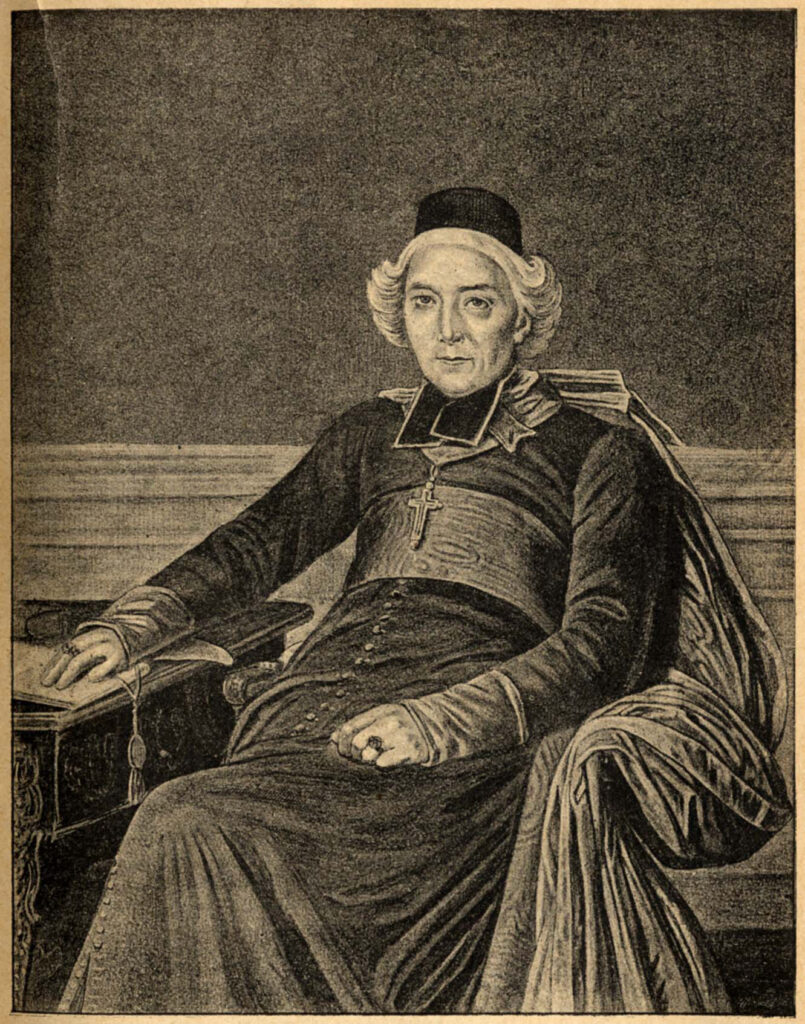
For Mgr de Beauregard Bishop of Orléans (photo opposite, courtesy of the Departmental Archives of Vendée), Mr. Sauvage had had the advantage of knowing him in 1817 during the stay that this worthy Prelate, then appointed to the bishopric of Montauban, made at the seminary of St Sulpice. He had had the leisure to appreciate the kindness, the zeal and the charity of this venerable Prelate, it was he who received him in his arms in a fainting which occurred to M. Sauvage. The first letter that was posted was that of the Bishop of Orleans.
Saint Hilaire, patron of the birthplace of this worthy Prelate wanted Mr. Sauvage not to forget his feast day by giving this letter written that same day and addressed to one of his compatriots, the happiest success. But as M. Sauvage did not know, he resolved to console himself and take some advice to write to the Mother Prioress of Nantes. The trip of a postulant who had joined Miss Gosselin provided her with the opportunity. This young lady named Miss Lerebourg, was from Brittany, she wanted to say a last goodbye to her family before entering the community, she gladly took on the letter for this Reverend Mother; the answer she gave to M. Sauvage is so full of interest in the good work and filled with such wise advice that the reader will be grateful to transcribe it here:
I have had, Sir, as you have learned, knowledge of the steps you have taken with the Bishop of Le Mans and the Reverend Mother Aimée of Jesus. I would have liked it to be possible for me to give her the subject she asked of me in order to facilitate your projects, and it was with difficulty that I gave her a refusal dictated by the circumstances. I fear that at this moment it will not be easy for you to find subjects such as you need to undertake a foundation. Orleans has given several Prioresses to different monasteries, we have given a Mother and a Sister to Le Mans, which prevents us from making new sacrifices, despite the desire that we would have, then again the Lord withdrew from the earth this last year an extraordinary number of daughters of Saint Thérèse, all young, all capable, all full of virtues and means, which impoverishes our monasteries by enriching heaven; we have not been spared in this harvest which the Lord has made, so that our number is hardly enough to fulfill our offices; if we experience great difficulties in founding now, and if you have very zealous postulants capable of being worthy daughters of Saint Thérèse, it seems to me that it would be advantageous for them and for the later execution of your pious projects, to give them entrance to one of our houses, where they would only be received on the condition of being returned to you. In a house where order reigns where the rule is in all its vigor, grasps the spirit of regularity better and much more quickly, than in a nascent house, where it is only after many years that we can remain closed and in regularity.
This thought that came to me for you before the Blessed Sacrament, I allow myself to make it known to you without wanting to offer it to you as advice that I would not dare to give you, but I believe that it would be advantageous for you, during may the good Lord put obstacles in your foundation, may your suitors be formed for religious life, may they begin the same novitiate together in the same house, under the same mother, because I find it much more suitable that they do not not separate; than to enter different houses to meet afterwards, the rule, the constitutions are scrupulously observed everywhere, but there are certain customs which sometimes vary by the position of the houses, by the country in which one lives, on nuns made and experienced this does not produce a great effect, on young people who often cling more to the letter than to the spirit, it could result from it inconveniences. I tell you all this to prove to us, Sir, the real interest that I take in your work, which I will concern myself with before the good Lord, asking him to make his holy will known to you and provide you with the necessary means to succeed in your pious desires, if a new house of Carmelites is to glorify him in your diocese, I congratulate you on the charitable zeal which animates you, on the combats which do not put you off, on the devotion which you have for our seraphic Mother so embraced by God's love, this devotion to Saint Thérèse can only be very advantageous to you, and I am sure that you will feel the great credit she has with God; this saint, so great and so courageous, fought well for the Lord, without being distracted by the almost invincible obstacles she encountered, so she will support you and make you victorious in one moment or another, that is to say in the one that sweet Jesus has fixed and which is still unknown to you.
This admirable letter from Mother Marie de Saint Pierre was indeed a consolation that God gave to M. Sauvage. The advice it contained had been dictated by the Holy Spirit, for almost at the same time this divine Spirit was communicating the same inspiration to the Mother Prioress whom he had chosen to bring about the blossoming of this flower of Carmel which was to grow among the thorns. The response of the Bishop of Orléans having preceded that of the Mother Prioress of Nantes, M. Sauvage's heart began to expand without however having the certainty of success because this venerable Prelate only indicated to him the means. Here is what he said to him: "I was unable, Sir, to answer the interesting letter you did me the honor to write to me: the subject is interesting, and I wanted give knowledge of it, and to the Superior of the Carmelites of Orleans and even to this community, and after having all reflected on the request that you are making to us, the result was that we could not detach any of our good girls. This community, moreover, is not stingy with its subjects, it is on the other hand full of charity for the other houses and here is the proof of it, it has given since I became Bishop, four Prioresses and three nuns in Blois, Nantes , Le Mans, Reims and the community is reduced to fifteen, it is very little and besides we do not find among us souls capable of establishing a house. I know a very large house, it is that of Poitiers; you could knock on that door, but don't talk about me. This was a ray of light for M. Sauvage who, having been intimate with M. de Rochemonteix then Vicar General of this diocese, could not understand how he had not made this request earlier that Mgr de Beauregard insinuated to him, but as M. Michel also knew M. de Rochemonteix very particularly, and M. Sauvage hastened to inform him of the letter from Mgr d'Orléans. M. Michel replied at once: "I have just received your letter of January 30 and I am writing to Poitiers today as you wish." God grant our wishes. I will let you know the answer as soon as I receive it. »
Opening to a sixth Carmel: Poitiers
M. Sauvage also wrote, and he put a letter to the Mother Prioress of the Carmelites in that of M. de Rochemonteix. This worthy ecclesiastic was superior of this fervent community. He found in the proposal that was made to him enough to satisfy his zeal for the glory of God, he took the resolution to do all that depended on him to make this holy work succeed, the occasion was favorable to bring his community in his views, a retreat was going to be given to them by a canon of La Rochelle (M. Vicardière) he took advantage of this happy circumstance to announce this news. He first communicated it to the Mother Prioress by giving her M. Sauvage's letter. This proposal made a painful impression on this good Mother, thinking that she would have to part with one of her dear daughters; the community to whom he then spoke about it generally experienced the same pain, so great was the union that reigned between them! Then M. de Rochemonteix showed them the advantages of propagating the order to which they belonged; but as he neither wanted nor could compel anyone to devote himself to this holy enterprise, he obliged all the nuns to ask God during the retreat to deign to make his holy will known to them. If the Holy Spirit, he says, remains silent, we will answer negatively, if it is the contrary we will see what means we will take for the accomplishment of this holy work.
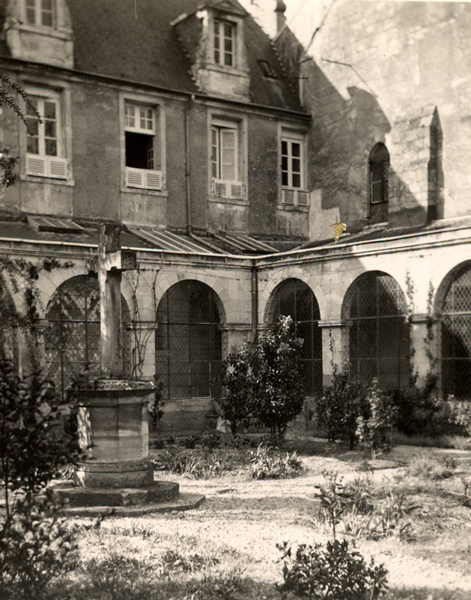
It was then that the various sentiments manifested themselves. The venerable elders, citing their infirmities and the poor health of several young nuns, concluded that the foundation was impossible. The ardent character of the mother sub-prioress demanded of her Superior that by his sole authority he designate those whom he considered suitable for this establishment.
But M. de Rochemonteix stuck to what he had said: that it would be God himself who would manifest his will, and that after his thoughts had been made known to him, either to himself or to the confessor, he would choose those who should undertake this new foundation.
Like a good Father, to console those of his daughters who were foreseeing a painful separation, he told them that for two subjects they would give, God would send them six. He reminded them of these words of the King-prophet: All the earth is the Lord's. He praised M. Sauvage and the priests of the diocese of Bayeux, assuring them that they would find very good Directors in them. Then, as he was of a very cheerful nature, he added that they should not trouble themselves, that the same sun that shone on them in Poitiers would light them in Normandy.
The maintenance of the evening recreation rolled on the foundation of Lisieux, the greatest number were dismayed by it, the others seemed to desire it. All of them would have liked to be at the end of the retreat to know the will of God, but they were very surprised after the retreat not to see M. de Rochemonteix; they were even more so when they heard in recreation the Mother Prioress interrupt the conversation they were holding on this subject, to forbid them to open their mouths, telling them that this important affair required prayers and not words. Not one allowed herself to say a single word of it until Easter, that day, the Mother Prioress having made known her intentions, returned to her daughters permission to speak of it.
Tasty answers from Poitiers... the tide is turning!!!
But let us return now to Lisieux, where we will see M. Sauvage form the saddest conjectures with the Postulants. Indeed, what to think of such a long silence, since the letters had been sent out for a month and the replies had not arrived. Finally, in the first days of March, M. Sauvage received the letter from M. de Rochemonteix and the Mother Prioress of Poitiers, this sincere friend of good M. Sauvage said to him:
My dear colleague,
You must be very surprised at my silence, you no doubt believe that I have been dead for at least a few days or that I have received your request so badly that I hastened to put it in the sinking fund. Luckily you are not a prophet, nor a soothsayer, nor a sorcerer. You will therefore know that I am alive although very tired from my rheumatism and that there is nothing I have forgotten less than the subject of your letter; it is in the interest of your cause that I have exposed myself to all your rash judgments, to all your calumnies. When I had the pleasure of receiving your missive, the good Carmelites were about to enter into retreat under the direction of a canon foreign to our diocese, I contented myself with informing them of your wishes, urging them to take care of this project during their prayers. On the closing day, I saw the superior who offered me a middle term that would favor your good work, as she explains to you in her letter in response to yours. I won't go into any details, I'll just tell you that he seemed wise to me. I will add that if you accept it, we could, by sending you back your subjects, lend you two of ours who are well capable of forming and directing your community, of all the religious houses of which I am the Superior, that of the Carmelites is indeed the more regular and more fervent. For the rest, you have a very big undertaking in view, in addition to the subjects, you need: 1°: a house of your own, ready to receive cloistered nuns. 2° you need enough to live on, that is to say about 300 fr. pension per nun. These are human calculations no doubt, but you have to think about it a little, I know very well that you have to rely a lot on Providence, but also you have to help yourself. If the Blessed Virgin, if only Saint Thérèse wants it, we must abandon ourselves to her will. I would consider myself very happy if I could render you some service in this holy enterprise; the thought of being agreeable to a confrere who is so dear to me, and to this diocese that I will always love, this thought was so sweet to me that I needed to be restrained by the wise remonstrances of the good mother prioress so as not to send you three nuns. After this retreat they were so fervent that a fairly large number would have liked to set off to discover this new world!
Accept, very dear colleague, all the feelings of your old friend, who will always keep you a place without this heart which is so well known to you. Please offer my very humble respects to Mr. your uncle, my friendships to the MM of the Minor Seminary whom I knew in Bayeux.
This letter filled M. Sauvage with joy, he found a friend again and in this friend the devotion produced by sincere friendship. That of the Mother Prioress was no less consoling. "Monsieur," she said to him, "the requests you made to me touched me sensibly, they came at the moment when a respectable priest from La Rochelle came to give us a retreat, and during the eight days that it lasted we are busy with it before Our Lord, and more than once I have recognized that it is almost impossible for me at this moment to comply with your requests, I will simply give you the position of our community and at the same time present a means which, I believe, could make your project succeed in an advantageous way. Our community is made up of several invalids who are elderly, their virtues and their experience would make them well suited to form subjects, but their position does not allow them to be moved. The other nuns are too young and do not yet have enough experience to go and found and form subjects, but if you want to give us the three or four young people you are telling us about, we will form them as best we can. and when they have made profession, they themselves can return to found in their country and then they would have much more advantage, having the knowledge of what it is to be a community of Carmelites who live in the regularity of all the observances of our Holy Order.
The different jobs where we could place them would let them know what they would have to obtain for the community they want to form in Lisieux. Another advantage, and which is not the least since we are closely obliged to the divine office, is that finding themselves in the midst of a meeting large enough to be able to observe all the ceremonies, it will be much easier for them to learn them as they should be done, which would not be possible for them since there are not enough of them to do them well. For the pension it will be 300 francs. In addition, the cost of clothing and profession. Here, sir, are the proposals that I am making. If they are accepted, it would be necessary to let us know fairly quickly so that we can have the fabric for the dresses brought in so as not to delay the taking of the order any longer than necessary. clothes. Say, I beg you on my behalf to your fervent postulants that if they come to find us, they will find in each of us Mothers and Sisters who will all be devoted to them. Believe, Sir, that we are disposed to assist your pious enterprise in all that will depend on us. At the same time, M. Sauvage received a letter from M. Michel which contained the answer given to him by M. de Rochemonteix, this letter contained the same things expressed in that of M. Sauvage, he added to it the proposal of the Mother Prioress. .
Second part of the story: everything starts again with Poitiers!


